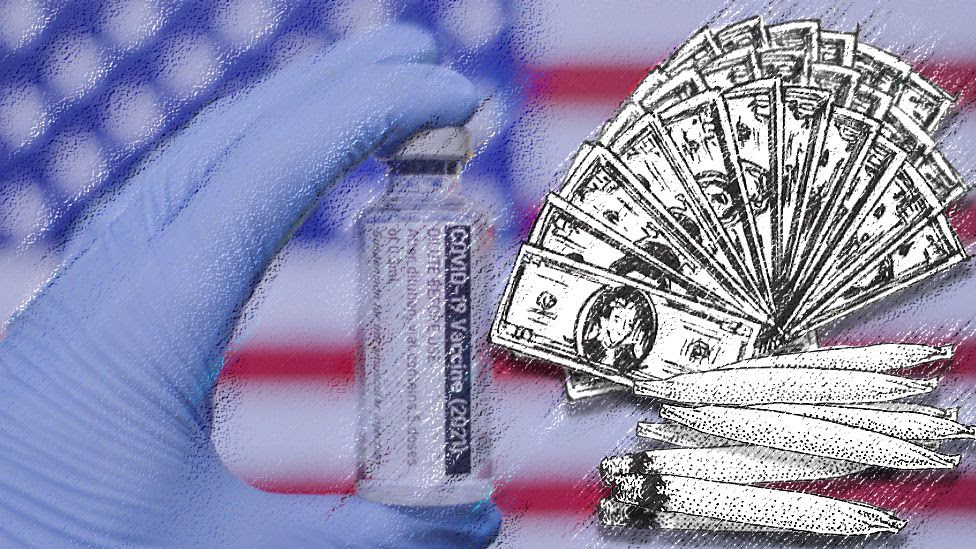Beers, biryanis, and even “Tinder boost” are up for grabs as countries around the world try to encourage hesitant people to get a Covid-19 vaccine.
Scientists say at least 65%-70% of the population need to be immunized to reach “herd immunity” – when enough of a population has protection against an infection that it stops being able to spread.
But there are fears some groups – especially young people – may be more hesitant about getting a jab.
To tackle vaccine hesitancy, companies, as well as local and government officials in different countries, are dreaming up eye-catching schemes to attract those unsure about getting jabbed to come forward.
Dating app ‘boost’
Officials across the US – which is trying to give 70% of adults at least one shot of the vaccine by 4 July – have various handouts to encourage people to get vaccinated.
The latest government scheme will allow dating app users who have been vaccinated to get a “vaccination badge” and special benefits on their profile.
The White House is partnering with several prominent dating platforms including Tinder, Hinge, and Bumble to give access to premium content to those who can prove they have been vaccinated, it said in a statement.
Getting the shot may also do more for lovers than keep them healthy, the White House added.
“According to research from OKCupid, people who are vaccinated or plan to get vaccinated receive 14% more Matches than people who don’t plan to get vaccinated,” it revealed.
Among the extra incentives being offered by Tinder, for example, is access to the “Super Like” feature to “help them stand out among potential matches”, the White House said.
Asked by the BBC if the scheme could be extended to other countries, a Tinder spokesperson said: “We are looking into ways we can best share information and resources around the vaccine to our members around the world.”

‘Vax & Scratch’
The state of New Jersey has launched “Shot and a Beer”, a scheme offering a free beer to those who get their first dose in May. To claim a drink, those who have been jabbed must take their vaccination card to one of 13 participating breweries.
Some states have been offering financial incentives to boost jab take-up.
New Yorkers who get Covid-19 shots next week will receive free lottery scratch cards with a chance to win $5m (£3.5m), State Governor Andre Cuomo announced on Thursday.
The scheme, called “Vax & Scratch”, will allow those who get vaccinated to receive a $20 lottery ticket
“The chances of winning something are one in nine,” Governor Cuomo said. “It’s a situation where everyone wins.”
“Pot for shots”
Some companies are using more unconventional ways to encourage people to get vaccinated.
The Greenhouse of Walled Lake, a marijuana dispensary in Michigan, is giving out “pot for shots”.

Some of the recipients of a Michigan marijuana dispensary’s “Pot for Shots” scheme
Since launching in February, the firm has handed out over 35,000 free joints, according to owner Jerry Millen.
“It’s been overwhelming,” Mr Millen told the BBC. “I thought, what a good way to reward people who are getting the vaccination.”
Gold nose rings
Officials in Dubai have adopted a healthier scheme to encourage people to get vaccinated.
Residents who have been fully vaccinated will be allowed a fortnight’s gym membership, The National reports.
The “Everyone is Responsible for Everyone” scheme will give them access to a number of popular fitness centres, the newspaper says.
In the Indian city of Rajkot, Gujarat, goldsmiths have banded together to give women free gold nose pins for getting the jab, while men are offered a hand blender, the ANI news agency reported.
And a kitchen in the city of Vizianagaram, Andhra Pradesh, is handing out free biryani to those who have been jabbed, according to The Hans newspaper.
“I feel that it’s my responsibility to encourage vaccination to protect the society from Covid. So I am giving free biryani for the people who are vaccinated,” the newspaper quoted Kolagatla Pratap, who runs the restaurant, as saying.
But do these incentives work?
Despite the efforts to incentivise people to get jabbed, some behavioural scientists question how effective the schemes will be.
The incentives risk being “a distraction and it could be counterproductive”, Susan Michie, a Professor of Health Psychology at University College London and an adviser to the UK government on Covid-19, tells the BBC.
She says the most effective way to ensure people get the vaccine in the UK has been the “intrinsic motivation” of “caring for the community”.
But, she says, if you offer people the “extrinsic motivation” of rewards, “it undermines the whole thing”.
“It’s about what we do as a whole population. It’s not about individuals,” she says. “We want people to understand why they’re doing it: they’re not doing it for a bit of money or a bit of beer.”
She fears people might be less likely to get a “booster” jab in future if the reward is no longer there.
“Those are going to be the powerful motivators that will go on over time.”
By Jack Hunter
BBC News



Comment here